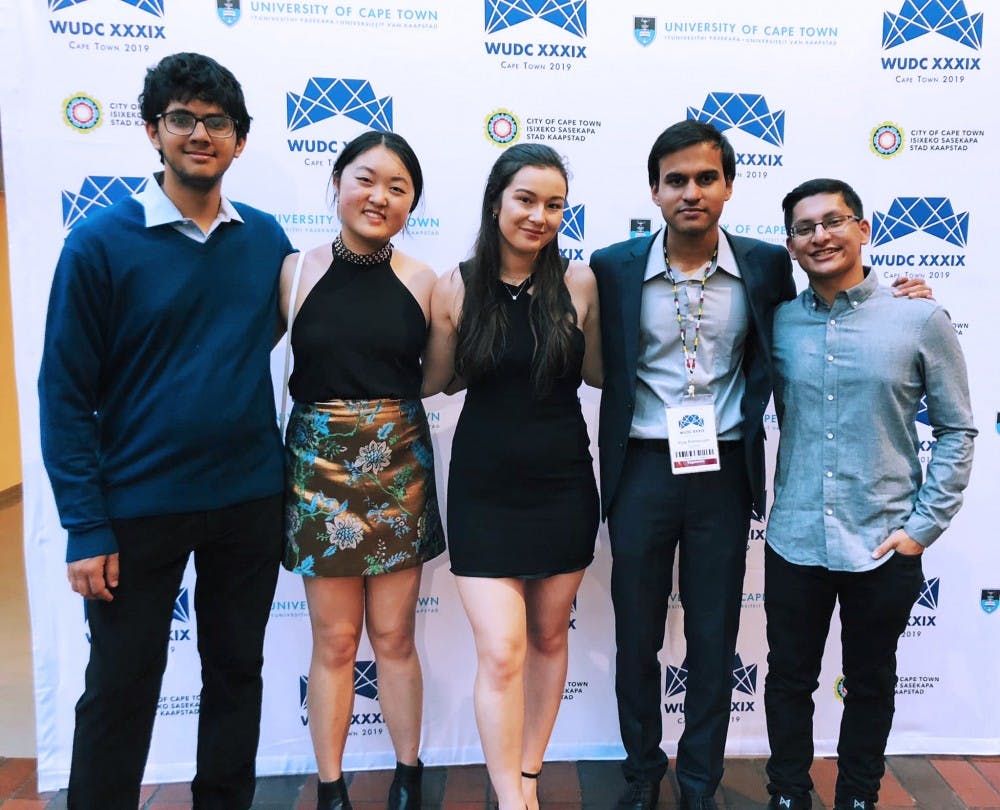
Several students in the Penn Debate Society traveled to South Africa over winter break and took top spots in the World Universities Debating Championship, the largest debate competition in the world.
The Penn delegation, made up of three teams of two people, faced 400 teams of debaters from over 90 countries representing institutions such as Harvard University, Princeton University, University of Oxford, and Cambridge University. Competitors went through nine initial rounds of debates over the span of three days, with the top 48 teams breaking into the octafinals. The tournament was hosted in Cape Town and ran from Dec. 27 to Jan. 4.
PDS Vice President and College sophomore Anish Welde and his partner, Wharton and Engineering junior Vijay Ramanujan, placed 16th in the debate competition. Based on his performance in the paired debate, Welde was also ranked the 31st speaker in the world. Debate partners and College seniors Alex Johnson and Rishabh Tagore placed 46th, making this year the first time in recent history that more than one Penn team advanced to the octafinals.
Team member and College sophomore Karthik Tadepalli said he frequently attended debate tournaments leading up to the WUDC, spending about 20 hours each week practicing. Despite the intense preparation, he added that he still tried to enjoy himself.
“I’ve been in several debate tournaments before, and I was really determined that I wanted to make this one a better experience, and so I try not to stress too much about the results of each round," Tadepalli said. "By and large, I felt that each round felt like it was fun."
To qualify for the competition, debaters sent in video tapes and were selected by a panel of three past debaters affiliated with the WUDC. PDS President and Wharton junior Stephanie Wu said she was excited when she was selected to compete.
“It’s such a great bunch of people who just love wrestling with intellectual ideas just for the sake of it," she said. "It’s nice because normally, I think, sometimes people might get offended if you attack their ideas but I think in the debate context, it’s quite well understood that you’re attacking the idea, not the person."
During the competition, allegations of racism emerged when a participant posted an offensive social media message about one the tournament's judges. When the delegate apologized privately but refused to apologize publicly, more people came forward with incidents of discrimination. Welde said this resulted in several debaters hosting a sit-in during the final round of the WUDC. They also requested an apology from the organizing committee, which was delivered about five hours later.
Welde said racism is prevalent in the debating world, citing “debaters of color not being listened to, or not having their points taken, or judges not taking notes during speeches of debaters of color, or even women."
"That kind of discrimination still pervades the debating community, and it was especially apparent that even the African teams who were able to make it onto elimination rounds composed largely of white debaters,” Welde added.
On their Facebook page, WUDC posted a statement from the Adjudication Core, a group of tournament staff responsible for judging the debates, regarding the incident.
“We acknowledge that there are systemic biases that affect the fairness of debating as a whole, and that it is difficult to change all of these institutional factors overnight," they wrote in the message. "We hope that as a collective, the debating community will continue to discuss these issues and work towards making debating more inclusive for everyone.”
Despite this, Welde said he enjoyed meeting people from around the world and competing in the tournament.
“Debate is an activity, to me, that unifies people across classes, different worlds, different societies, different upbringings, different experiences," he said. "Getting to hear a bit how debate has impacted other people’s lives definitely showed me the value of what this activity brings."
The Daily Pennsylvanian is an independent, student-run newspaper. Please consider making a donation to support the coverage that shapes the University. Your generosity ensures a future of strong journalism at Penn.
Donate






